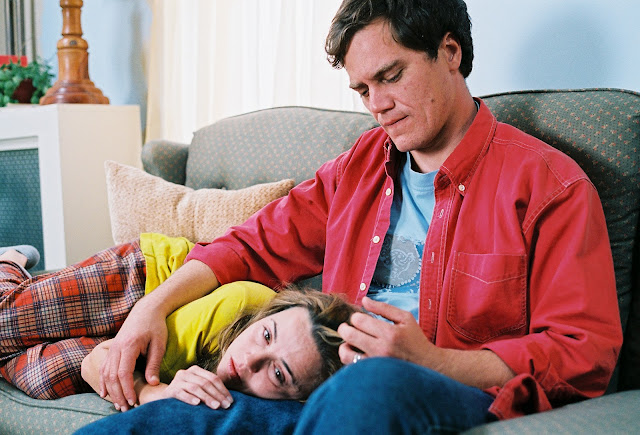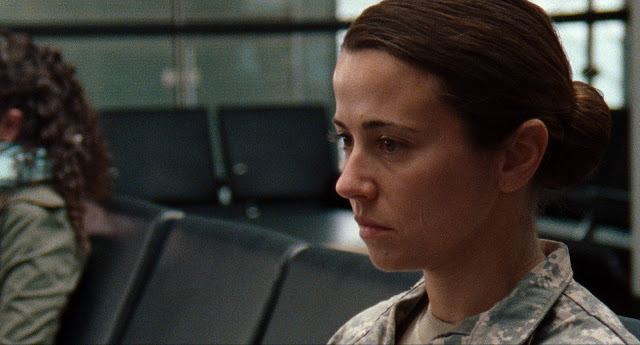 |
| Linda Cardellini as Kelli in Return |
Written by Megan Kearns.
When people discuss war, they often don’t take women or gender into account. While we regularly watch male soldiers on-screen, we almost never see war through women’s eyes. If women are in war films, they serve as wives and girlfriends. We see women supporting men, never soldiers themselves. That’s what makes Return so unique. It puts a female soldier center stage.
Written and directed by Liza Johnson (her directorial debut) and executive produced by Abigail Disney and Meredith Viera, Return features a captivating and quietly powerful performance by Linda Cardellini (the soul and strength of the film) as Kelli, a female soldier grappling to step back into her life after returning home from her tour of active duty.
Kelli is excited to reunite with her husband (Michael Shannon) and her two young daughters. Disconnected from her former life, she eventually finds she can no longer relate to her friends, co-workers and family. Return tells the story of a complex woman struggling to survive and wrestling with her inner demons.
While it moves at a glacial pace, it pays to be a vigilant audience. For in those silent moments, the restrained film speaks volumes. The devastatingly outstanding Cardellini (it will seriously be a crime if she’s not nominated for an Oscar) doesn’t need to utter a single word. Her expressive face reveals everything. We glimpse Kelli’s isolation and torment. It’s incredibly moving and heartbreaking as we see a woman trying to assert control as her life begins to crumble.
Unlike her husband and daughter, Kelli doesn’t find humor in a woman falling down on an America’s Funniest Home Videos show. She watches in stunned silence as another mother ebulliently applauds her daughter at cheerleading practice. When she goes to get a drink with her girlfriends, Kelli crawls out the bathroom window to escape. She quits her factory job thinking it’s a “giant waste of time.” Her relationships suffer as she unravels.
 |
| Linda Cardellini and Michael Shannon |
Throughout the film, people keep telling Kelli to open up and talk about her deployment. They claim sharing trauma will heal her wounds. But Kelli insists there’s nothing to tell and incessantly says, “A lot of people had it worse than I did.” While researching her role, Cardellini found reticence and refusal to discuss combat a common thread connecting veterans, both female and male.
We never really discover Kelli’s war experiences other than she worked with military supplies. The beautifully restrained film shows rather than tells as subtle clues to Kelli’s inner turmoil unfold. When she’s in a large cage with some pigeons, Kelli cowers, her hands protecting her head. She watches a TV screen with a hollow dazed stare. When her husband tries to reignite their spark by tickling her, Kelli becomes increasingly uncomfortable and defensive, finally screaming for him to stop.
Her family and friends, while relatively supportive at first, seem to expect Kelli to remain unchanged and have little tolerance for her growing instability. Adrift with no anchor, we witness Kelli’s growing desperation as she spirals out of control. When her friend accuses her of “acting crazy” and asks her what happened to her over there, Kelly replies:
“Yeah, well a lot of people had a lot worse. You know I didn’t get raped in a port-o-potty. I didn’t have to fucking carry a dead body. And I didn’t get blown up by an EOD so I consider myself pretty lucky cause that’s what happens over there.”
It’s vital we include a gender lens when discussing soldiers and war. Female soldiers face unique challenges such as rape (although yes, men are raped too) and sexual harassment. 1 in 3 women are raped while serving in the military. In fact, female soldiers are more likely to be raped by a fellow soldier than killed in combat. Horrifying. Return isn’t a film about female soldiers surviving rape. Yet it subtly weaves in a crucial gender commentary.
 |
| Linda Cardellini and John Slattery |
As I’ve said before, mothers are supposed to be everything to everyone. So when she falters, Kelli’s motherhood is called into question. Amidst a fight, her husband tells her to “be a mother.” She struggles to provide the attention and care her daughters need. At her wits end, Kelli tries to get pregnant in order to prevent another deployment and stay with her daughters. The most poignant and wrenching scenes are the ones with Kelli playing with and embracing her daughters.
Inspired by a friend’s experiences, writer/director Johnson spoke with “women who have been deployed.” Talking about gendered expectations for female soldiers, Johnson said:
“Expectations and pressures are different for women – dealing with rage is harder for them and not as acceptable as it is for men.”
Kelli tries to deal with her anger, frustration and disappointment in a world telling her to express her feelings in an “appropriate” way yet really expecting her (and basically all women) to swallow her pain.
Soldiers risk their lives for our country. Return doesn’t make any overt political statements. It honors and respects soldiers’ sacrifices. Yet Kelli’s struggles crystallize the physical and emotional toll war exacts on soldiers and their families. Is the price worth it?
Without preaching or sermonizing, the film affirms we must do more to support our troops. And it reminds us women serve in the military too. Something we obviously all know yet too easily forget.
We need more films about women, created by women. And we desperately need more movies telling stories of female soldiers whose stories too often go unheard.
